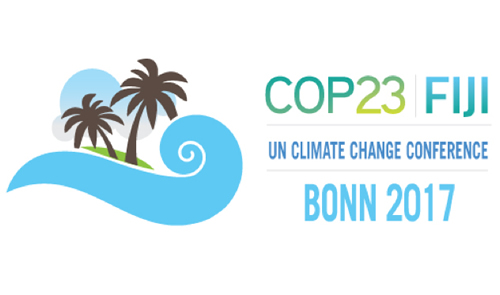Leaders at Bonn commit more to renewable energy
 Various leaders and actors from a wide range of sectors attending the UN Conference of Parties (COP23) on Climate Change, on Friday announced a new set of initiatives to transition to renewable energy.
Various leaders and actors from a wide range of sectors attending the UN Conference of Parties (COP23) on Climate Change, on Friday announced a new set of initiatives to transition to renewable energy.
They also have indicated that more ambitious clean energy development could quickly become a bigger part of national climate plans submitted under the Paris Agreement.
The leaders made the commitment at a side event dubbed, the Energy Day, organised by the Climate Group, the International Energy Agency (IEA), the International Renewable Energy Agency (IRENA) and the Sustainable Energy for All (SEforALL) as part of a series of thematic action days held under the auspices of the Marrakech Partnership.
The day consists of four sessions, covering: the State of the Energy Transition; Policies needed to enable Change; Experiences of Leaders around the world who are catalysing action; and Recommendations for Accelerating Progress.
The Marrakech Partnership aimed at catalysing greater climate action, including at the sub-national and corporate level, in the period from 2017 to 2020.
Since Energy Day was launched at COP21 in Paris, CO2 emissions have remained flat, the costs of renewable energy technologies have dramatically fallen, and renewable energy deployment has generally outpaced the targets governments set for themselves in their Nationally Determined Contributions (NDCs).
“With the price of renewable and storage technologies tumbling, and greater understanding on how to set the policy table for a cleaner energy mix and more integrated energy planning, the question before decision makers is, why wait?” said Rachel Kyte, Special Representative of the UN Secretary-General and CEO, Sustainable Energy for All.
Success stories, action and new commitments shared during the Energy Day at the COP23 UN Climate Change Conference from businesses, states, cities and forward-thinking countries continued to show ambition to ensure the clean energy transition was not only underway but was irreversible.
“Our pledge to leave no one behind is a critical component of the Paris Agreement. The energy transition that we can see is underway and must be a transition towards energy systems around the world that secure sustainable energy for all,” said Ms Kyte.
“This means placing energy efficiency first, adopting a laser like focus on ending energy poverty and using the renewable energy revolution to achieve universal access and a bending of the emissions curve,” she said.
Adnan Z. Amin, Director of IRENA) said: “Two-thirds of global greenhouse gas emissions stem from energy production and use, which puts the energy sector front and centre of global efforts to combat climate change.
“Our analysis shows that renewables and energy efficiency can together provide over 90 per cent of the mitigation needed in the energy system by 2050 to achieve the ambitions of the Paris Agreement, while also boosting the economy, creating jobs and improving human health and well-being.
“We have a large, untapped, and affordable renewable energy potential waiting to be developed. Revising the Nationally Determined Contributions (NDCs) gives countries an opportunity to take a fresh look at how to harvest this potential, not only for mitigation, but in light of the multiple socio-economic benefits of renewables, also for adaptation.”
Fatih Birol, Executive Director of IEA, said: “The transition of the energy sector in the next decades will be critical to meeting shared climate and sustainable development goals.
“Widespread action by governments and private sector alike has helped keep global energy-related emissions flat the last three years. Our analysis shows we can meet climate goals while achieving energy access and improving the environment.”
The central goal of the Paris Agreement is to keep the average global temperature rise well below 2 degrees Celsius and as close as possible to 1.5 degrees.
Experts say about one degree of that rise had already happened, underlining the urgency to progress much further and faster with the global clean energy transformation.
A total of 13 countries and the IEA announced a new multi-year, EUR 30 million plan to support clean energy transitions around the world, on November 7, at the launch of the “IEA Clean Energy Transitions Programme”.
The new programme would leverage the IEA’s unique energy expertise across all fuels and technologies to help accelerate global clean-energy transitions, particularly, in major emerging economies.
Meanwhile, more participants continue to trickle in at the COP 23 in Bonn, Germany with various environmental and organisations and interest groups still talking about climate change mitigation within both closed and open door meetings.
The various parties and negotiators, including Ghana’s contingents of technocrats and officials from the Environmental Protection Agency, (EPA) Ministry of Finance, Ministry of Mines and Natural Resources and the Forestry Commission are all participating in the COP23.
The Environment and Science Minister, Professor Kwabena Frimpong-Boateng and Mines and Natural Resources Minister, Mr John Peter Amewu, together with Mr Peter Abum Sarkodie, the Executive Director of the EPA, are expected to be at the Bonn conference next week.
COP23, being hosted by the Republic of Fiji as the chair of the event, and being supported by the German Government, opened on Monday, November 6, and it would close on Friday, November 17.
Delegates around the globe are hoping to ensure greater momentum for the Paris Agreement and to raise the level of ambition needed to address global warming at the two-week event.
Source: GNA
